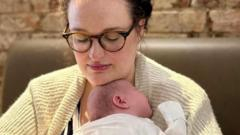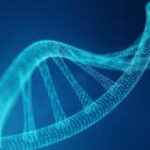Philippa Roxby
Health Reporter
Charlie Beattie
Charlie Beattie holds her nine-week-old baby in her arms after many years of miscarriages
UK scientists say they have developed a test which can help identify women with an abnormal womb lining that increases their risk of miscarriage.
They say their work could pave the way for new treatments for those going through repeated pregnancy loss.
In some women with a history of miscarriage, the womb lining doesn’t react the way it should – transforming into a supportive place for the embryo to implant, the University of Warwick team discovered.
Charities say the findings could help provide an explanation, in some cases, for the trauma and devastation of recurrent miscarriage.
Around one in six of all pregnancies are lost, most before twelve weeks, and each miscarriage increases the risk of another one happening.
To date, most research in this area has focused on the quality of the embryo, with much less known about the role of the womb lining.
Dr Jo Muter, study author and researcher at Warwick Medical School, said: “Many women are told they’ve just had ‘bad luck’, but our findings show that the womb itself may be setting the stage for pregnancy loss, even before conception takes place.”
The job of the womb lining is to receive the embryo and help it develop during pregnancy, thanks to a reaction which conver
Read More




